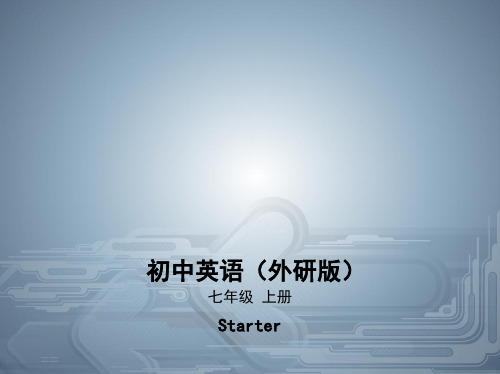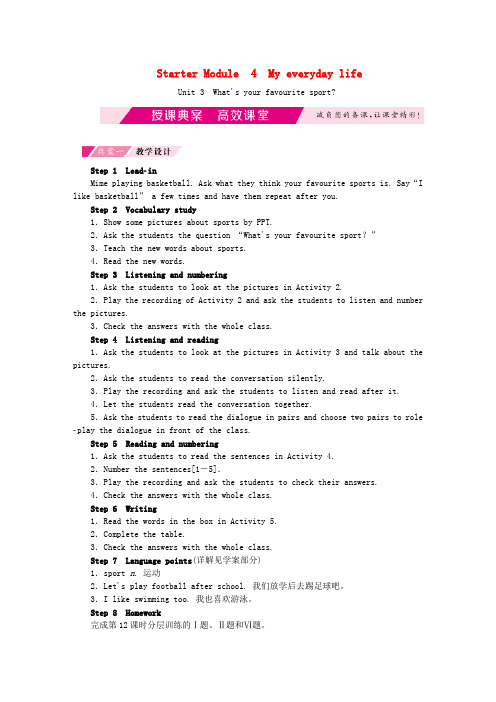七年级英语上册StarterModule4Myeverydaylife模块分层训练新版外研版
七年级英语上册StarterModule4Myeverydaylife课件新版外研版

—It is 1st June, 2014.
A. What day was it yesterday
B. What day is it today
C. What was the date yestee date today
( D )2. —What day is it tomorrow?
常考短语 _m_y__f_a_v_o_u_r_i_t_e__d_ay 我最喜爱的一天
典型句子 1. What day is it today? ____今__天__是__星__期__几__?_________________________________ 2. What day is your favourite day? ____你__最__喜__欢__星__期__几__?_______________________________
要点梳理
重点词汇精析 favourite的用法 【教材例句】 What day is your favourite day? 你最 喜欢星期几?(教材第S21页) 【要点思维导图】
【举例】 My favourite fruit is apples. 我最喜欢的 水果是苹果。
Rice is my favourite food.米饭是我最喜爱的食物。 Football is my favourite. 足球是我的最爱。 【应用】 1. 谁是你最喜欢的老师?(根据汉语意思补全句子) Who's yourf_a_v_o_u_r_i_t_e teacher? 2. His favourite food is cakes. (同义句转换) He _l_i_k_e_s___ cakes _b_e_s_t____.
外研版七年级英语上册课件Starter Module 4 My everyday life

新课讲解 2 Listen and repeat.
Sunda Monda Tuesday Wednesda Thursda Frida Saturday
新课讲解
Language point 1 What day is it today?
Point
What day is it today?今天是星期几?
此句型回答形式有: ① 直接回答是星期几。 ② It’s +星期几. ③ Today is +星期几. ④ It’s +星期几+today.
新课讲解
A:What day is it today? B:It's... A:What day is it tomorrow? B:It's... A:My favourite❸ day is...What day is your favourite day? B:It's...
eg:—What day is it today?今天是星期几? —It's Sunday./Sunday./Today is Sunday./It's Sunday today.今天是星期天。
It's Monday today.(对画线部分提问) __W__h_a_t__ ____d_a_y__is it today?
3. Thursday,Friday, Saturday
.
4. Sunday ,Monday,Tuesday.
5. It's Wednesday today. Tomorrow is
外研版七上英语Starter Module 4 My everyday life 模块提升写作作文课

名师点评 这段对话贴近日常生活,符合英语的表达习惯,体现了作 者正确运用所学知识的能力,是一篇较好的习作。 ①用"What day is it today...?"询问今天星期几; ②用"What's the weather like...?"询问天气状况; ③用"What's your favourite...?"询问对方最喜欢的事物; ④用"Let's do sth."结构表示提议做某事。
教材原句 What's the weather like in spring?(教材PS22)
Lily: It's sunny. Jane: ③What's your favourite sport?
教材原句 What's your favourite sport, Daming?(教材PS24)
1. What day is it today/tomorrow? 今天/明天是星期几? 2. What's the weather like…? ……天气怎么样? 3. What's your favourite sport? 你最喜欢的运动是什么? 4. Let's… 咱 tennis. Jane: I like table tennis too. Lily: ④Let's play table tennis after school.
教材原句 Let's play football after school.(教材PS24)
Jane: OK. Good idea!
佳作展示 Jane: Good morning, Lily. Lily: Good morning, Jane. Jane: ①What day is it today, Lily?
最新七年级英语上册 Starter Module 4 My everyday life教案 (新版)外研版

Module 4 My everyday life.Unit 1 What day is it today?Ⅰ. Analysis of the text:In this text students will learn how to ask and answer “What day is it today?”, “What’s the weather like today?” , “What’s your favourite sports?”.Ⅱ. Arrangement of teaching in this moduleThree periods for this module, one period for one unit.Ⅲ. Teaching focus:1. Students will comprehend and produce the sentence structures.2. Students will learn about acti vities and the weather .and some sentences about them.3. Students will successfully request information about activities and the weather .and can talk about their activities the like.4. Key vocabulary and phrases:day, today, Monday, Tuesday, Wednesday, Thursday, Friday, Saturday, Sunday, yesterday, birthday, favourite, spring, summer, autumn, winter, warm, hot, cool, cold, weather, like, basketball, football, swimming, table tennis, sport, let, us, let’s=let us, play, after, school, idea5. Key structures:1) What’s your favourite sport?2) Do you like watching television?3) Can you speak English?4) What’s the weather like in summer?6. Be skilled in oral expression of asking and answering everyday life.Ⅳ. Teaching aims:1. Listening: To understand the listening parts in the text about activities and the weather.2. Speaking: To master the sentence structures and practice.3. Reading: To know something about activities and the weather.4. Writing: Write a composition about “ My favourite sport”Ⅴ. Teaching Procedures:Step 1 Lead in:Step 1 Lead in:1. Review English expression of colours.2. Show some pictures by PPT, ask and answer “What colour is it?”.3. Ask and answer. What day is it today?4. Learn new words: Sunday, Monday, Tuesday, Wednesday, Thursday, Thursday, Friday, SaturdayStep 2 Vocabulary study:1. Show some pictures by PPT.2. Ask and answer: What day is it today?3. Learn the new words.4. Read the new words.Step 3 Listen and read.1. Play the recording and ask the students to listen.2. Ask the students to read the conversation silently.3. Play the recording and ask the students to listen and read the conversation.4. Read the conversation together.5. Act it out.Step 4 Work in pairs.Monday—Good morning, class. What day is it today?—It’s Monday.—Yes, it’s Monday. Write it in your book.—M-O-N-D-A-Y, Monday.—What day is it tomorrow?—Tuesday.—Yes, tomorrow is Tuesday.Step 5 Listen and repeat.1. Ask the students to look through the table in Activity2.2. Play the recording and ask the students to listen.3. Listen and repeat.4. Now point, ask and answer.What day is it? It’s …5. Work in pairs.Step 6 Read and match.1. Ask the students to look through the sentences in Activity 3.2. Match the sentences.1 Today is Wednesday. What day is it tomorrow? a) Sunday.2 Today is Friday. What day is it tomorrow? b) Tuesday.3 Today is Monday. What day is it tomorrow? c) Thursday.4 Today is Saturday. What day is it tomorrow? d) Saturday.5. Call back the answer from the whole class and check the answer. Keys: 1. c 2. d 3. b 4. aStep 7 Work in pairs.1. Ask and answer like this.—Today is … What day is it tomorrow?—It’s …Step 8 Listen and write.1. Play the recording of Activity 5.2. Listen and write.1. ________________ 5 .________________2. ________________ 6. ________________3 .________________ 7. ________________4. ________________3. Call back the answer from the whole class and check the answer.Step 9 Write.1. Ask the students to read the words in Activity 6.2. Complete the table in Activity 6.1 What ____________ is it today?2 Today is Tuesday. Tomorrow is ___________.3 Thursday, Friday, ____________4 ___________, Monday, Tuesday.5 It’s Wednesday today. Tomorrow is ________3. Call back the answer from the whole class and check the answer.Keys: 1. day 2. Wednesday 3. Saturday 4. Sunday 5. ThursdayStep 10 Work in pairs.1. Ask and answer like this.A: What day is it today?B: It’s …A: What day is it tomorrow?B: It’s …A: My favourite day is… What day is your favourite day?B: It’s …2. Work in pairs.Unit 2 What’s the weather like?Step 1 Lead in:1. Review the text of Unit 1.2. Show some pictures, ask the students to look at the pictures, then talk something about the pictures.3. Introduce the new words.Step 2 Vocabulary study:1. Show some pictures by PPT.2. Ask and answer:What’s the weather like today?3. Learn the new words.4. Read the new words.Step 3 Listen and repeat.1. Ask the students to read the words in Activity 1 silently.2. Play the recording and ask the students to listen and read the words.①spring ②summer ③autumn ④winter⑤warm ⑥hot ⑦cool ⑧coldStep 4 Listen an d match.1. Ask the students to look at the pictures in Activity2.2. Read the words in Activity 2 silently.1. It’s cool in autumn.2. It’s hot in summer.3. It’s cold in winter4. It’s warm in spring.3. Look through the words in Activity1.①spring ②summer ③autumn ④winter⑤warm ⑥hot ⑦cool ⑧cold4. Play the recording and ask the students to listen and read the words.5. Call back the answer from the whole class and check the answer.Step 5 Listen and point.1. Ask the students to look at the pictures in Activity 3.2. Ask and answer like this:1) —What’s the weather like in spring?—It’s warm.2) —What’s the weather like in winter?—It’s cold.3) —What’s the weather like in autumn?—It’s cool.4)—Wha t’s the weather like in summer?—It’s hot.3. Listen again and say.4. Work in pairs.Step 6 Write.1. Ask the students to read the words in Activity 6.2. Fill in the blanks in Activity 5.1.—What’s the ____________ like in London in autumn?—It’s cool.2.—What’s the weather _____________ in New York in __________?—It’s cold.3.—_____________________ in Hong Kong in summer?—It’s hot.4.—_____________________ in Beijing in spring?—__________________3. Call back the answer from the whole class and check the answer.Keys: 1. weather 2. like, winter 3. What’s the weather like4. What’s the weather like, It’s warm4. Now listen and check.Step 7 Work in pairs.1. Show a map of China. Talk about the weather.2. Ask and answer like this.—What’s the weather like in Harbin in winter?—It’s cold.3. Work in pairs.Unit 3 What’s your favourite sport?Step 1 Lead in:1. Review the text of Unit 1 and2.2. Show some pictures, ask the students to look at the pictures, then talk someth ing about the pictures.3. Introduce the new words.1. basketball2. football3. swimming4. table tennisStep 2 Vocabulary study:1. Show some pictures by PPT.2. Ask and answer:What’s your favourite sport?3. Learn the new words.4. Read the new words.Step 3 Listen and number.1. Ask the students to look at the pictures in Activity2.2. Read the word s in Activity 1.3. Play the recording and ask the students to listen and number.4. Call back the answer from the whole class and check the answer.Keys: b d a cStep 4 Listen and read.1. Ask the students to look at the pictures in Activity 3.2. Talk something about the pictures.3. P lay the recording and ask the students to listen.4. Ask the students to read the conversation silently.5. Play the recording and ask the students to listen and read the conversation.6. Read the conversation together.Tony : What’s your favourite sport, Daming?Daming: Football!Tony: It’s my favourite sport too!Daming: Let’s play football after school.Tony: OK. Good idea!Betty: What’s your favourite sport, Lingling?Lingling: Swimming.Betty: I like swimming too.Lingling: Let’s go swimming on Wednesday.Betty: OK.7. Act it out.Step 5 Read and number.1. Ask the students to read the sentences in Activity 4.2. Re ad and number.a) What’s your favourite sport? □b) Let’s play basketball after school. □c) OK. Good idea! □d) Basketball! □e) I like basketball, too. □Keys: a1 b4 c5 d2 e33. Call back the answer from the whole class and check the answer.4. Listen again and check.Step 6 Write.1. Read the words in Activity 5.basketball football swimming table tennis2. Complete the table.go playswimming basketball3. Call back the answer from the whole class and check the answer.Keys: go swimming play basketball play football play table tennis Step 7 Work in pairs.1. Ask and answer like this.—What’s your favourite sport?—…—Let’s … this afternoon.—OK...2. Work in pairs.Step 8 Listen and write.1. Play the recording and ask the students to listen.2. Fill in the blank.A: What’s ___________________ sport?B: I like _____________.A: Let’s ____________.B:. OK.____________.3. Now listen again and check.Keys: your favourite swimming go swimming Let’s go。
2019年外研版七年级英语上册课件:Starter Module 4 My everyday life(共90张PPT)

解析 询问天气状况要用“What's the weather like...”或“How's the weather...”,故答案为C。 答案 C
知识点十八 weather的用法 weather是不可数名词,意为“天气”。如:
What good weather it is today! 今天天气真好啊!
A.I B.me C.my D.mine
解析 本题考查人称代词的宾格。句意:张明擅长数学,他经常帮助我 学数学。help后要用人称代词的宾格,故所缺的词是me。 答案 B
Module 4 My everyday life
(二)物主代词 物主代词是表示“我的”、“你的”、“他的”等的代词,表示所属关 系。物主代词分为形容词性物主代词和名词性物主代词。具体如下:
Module 4 My everyday life
例2 (2017四川宜宾中考)—Is this your book?
—No. It's not
. It's
.
A.my;his
B.mine;hers
C.me;him
解析 本题考查代词的用法。答语的含义是“不,这不是我的。这是她 的”,第一空和第二空都要用名词性物主代词,故mine和hers符合题意。 答案 B
Module 4 My everyday life
知识点十七 关于“天气”的提问和回答 教材原文 What's the weather like in spring?春天的天气怎么样? “What's the weather like...?”用于询问天气状况。询问“天气状况” 还可以用:How's the weather...?如: —What's the weather like in winter?冬天天气怎么样? —It's cold.寒冷。
2016年秋七年级英语上册 Starter Module 4 My everyday life Un

Starter Module 4 My everyday lifeUnit 3 What's your favourite sport?Step 1LeadinMime playing basketball. Ask what they think your favourite sports is. Say“I like basketball” a few times and have them repeat after you.Step 2Vocabulary study1.Show some pictures about sports by PPT.2.Ask the students the question “What's your favourite sport?”3.Teach the new words about sports.4.Read the new words.Step 3Listening and numbering1.Ask the students to look at the pictures in Activity 2.2.Play the recording of Activity 2 and ask the students to listen and number the pictures.3.Check the answers with the whole class.Step 4Listening and reading1.Ask the students to look at the pictures in Activity 3 and talk about the pictures.2.Ask the students to read the conversation silently.3.Play the recording and ask the students to listen and read after it.4.Let the students read the conversation together.5.Ask the students to read the dialogue in pairs and choose two pairs to role play the dialogue in front of the class.Step 5Reading and numbering1.Ask the students to read the sentences in Activity 4.2.Number the sentences[1-5].3.Play the recording and ask the students to check their answers.4.Check the answers with the whole class.Step 6Writing1.Read the words in the box in Activity 5.2.Complete the table.3.Check the answers with the whole class.Step 7Language points(详解见学案部分)1.sport n. 运动2.Let's play football after school. 我们放学后去踢足球吧。
外研版七年级英语上册Starter Module4 My everyday life 模块知识点归纳

Starter Module 4 My everyday lifeWhat day is it today?必背单词1.day (n.)一天→days (pl.)2.birthday (n.)生日→birthdays (pl.)3.today (n.)今天4.Monday (n.)星期一5.Tuesday (n.)星期二6.Wednesday (n.)星期三7.Thursday (n.)星期四8.Friday (n.)星期五9.Saturday (n.)星期六10.Sunday (n.)星期日必背短语11.your favourite day你最喜欢的一天必背句子12.—What day is it today? ——今天星期几?—It's Monday.——星期一。
13.Today is Saturday.今天星期六。
What's the weather like? 必背单词1.warm (adj.)暖和的;温暖的→cool (反义词)凉快的2.hot (adj.)热的→cold(反义词)冷的3.spring (n.)春天4.summer (n.)夏天5.autumn (n.)秋天6.winter (n.)冬天必背短语7.in spring在春天必背句子8.It's hot in summer.夏天炎热。
9.What's the weather like in autumn?秋天天气怎么样?What's your favourite sport?必背单词1.swimming (n.)游泳→swim (v.)游泳2.play (v.)参加(体育运动或球赛);玩耍→plays(第三人称单数形式)3.us (pron.)(宾格)我们→we(主格)4.basketball (n.)篮球5.football (n.)足球6.sport (n.)运动必背短语7.table tennis乒乓球8.play football踢足球9.after school放学后必背句子10.—What's your favourite sport,Daming?——大明,你最喜欢的运动是什么?—Football.——足球。
七年级英语上册 Starter Module 4 My everyday life Un

b) Tuesday.
c) Thursday.
d) Saturday.
5. Listen and write
• 1______________________
________________________ ________________________ ________________
5.________________________
Work in pairs. ask and answer
A: B: A: B: A: What day is it today? It’s... What day is it tomorrow? It’s... My favourite day is… What day is your favourite day ? B: It’s… birthday
___________________________ ___________________________ ___________________________
Monday
Friday
• 2._____________________
________________________ ________________________ _______________
Starter Module 4 Unit 1
--What day is it today? tomorrow? --It’s … today. Tomorrow is …
星期日 Sunday
星期一 Monday
星期二 Tuesday
星期三 Wednesday
星期四 Thursday
星期五 Friday
星期六 Saturday
- 1、下载文档前请自行甄别文档内容的完整性,平台不提供额外的编辑、内容补充、找答案等附加服务。
- 2、"仅部分预览"的文档,不可在线预览部分如存在完整性等问题,可反馈申请退款(可完整预览的文档不适用该条件!)。
- 3、如文档侵犯您的权益,请联系客服反馈,我们会尽快为您处理(人工客服工作时间:9:00-18:30)。
My everyday life模块分层训练四Ⅰ.根据首字母或汉语提示完成下列句子(10分)1. My sister likes fruit, ________ (除……之外)apples.2. A car a________ happened last night.3. Can I ________(预订)two tickets to the concert tomorrow?4. I hope you will have a good ________ (旅行).5. He was feeling bad, h________, he still kept working.Ⅱ. 用所给词的适当形式填空(10分)1. The coming bus is ________ (crowd). Please let the old get on first.2. It's not so________ (easy) as I thought.3. The more you eat, the ________ (heavy) you'll be.4. They can travel ________ (hundred) of miles a day by car, just as they wish.5. Travelling by ship is a very pleasant way ________ (spend) a holiday . Ⅲ.根据汉语意思完成句子(15分)1. 她家离学校最近。
Her home ________ ________ ________ ________school.2. 骑自行车是去上学最好的方式。
Riding a bike ________ ________ ________ ________ ________ go to school. 3.由于交通堵塞,我今天上班迟到了。
I was ________ ________ work today________ ________ the traffic jam.4.乘坐飞机比乘坐长途汽车舒服很多。
Taking a plane is ________ ________ ________ ________ ________ taking a coach. 5.他的自行车和我的一样。
His bike ________ ________ ________ ________ mine.Ⅳ. 单项选择(10分)( )1. —Alice, would you like to go hiking with us?—What a pity! I am free every day ________ today.A. forB. exceptC. besidesD. among( )2.The bus was so ________ that Li Ming had to stand all the way.A. freeB. expensiveC. busyD. crowded( )3.It's raining hard, ________, the farmers are still working on the farm.A. butB. soC. howeverD. because( )4. —The Tshirt looks nice on you! How much doe s it ________?—I just ________ ten dollars for it.A. take; affordedB. cost; paidC. cost; spentD. spend; took( )5.I can't help you. Ask ________to help you.A. somebody elseB. else somebodyC. somebody otherD. other somebodyⅤ. 补全对话,有一项多余选项(10分)Annie: Hello, Kevin! 1. ________Kevin: My home is the farthest from our school, so I often go there by bus. What about you?Annie: 2. ________Kevin: I think it's the best way to go to school.Annie: What about your brother, Brad?Kevin: 3. ________Annie: Really? He is too great! 4. ________Kevin: No, he doesn't. He goes to work by taxi.Annie: Oh, it's the most expensive way.Kevin: 5. ________Ⅵ. 完形填空(20分)Dad wanted to take us for a threeday trip. We 1 to travel to Dali. It's far from our city. So we choose to go there by plane. It2 us much money, but it's the fastest way to travel. My sister and I felt 3 because it was the first time we had travelled there.We got there 4 the evening of 15th September. We felt a little tired. After 5 in our hotel for some time, my sister and I went out for the evening sightseeing tour. My parents didn't like it, 6 they stayed at the hotel.On the first day, we took a taxi to the Cangshan. The view(风景) was wonderful. To remember the beautiful time, I took many 7. On the second day, we took a 8 on LakeErhai. For dinner, we had something special—rice noodles. We 9 had that before. On the 10 day, we visited the Old Town of Dali. Walking around the beautiful town was really enjoyable.The trip was short, but we had a great time in Dali.( )1.A. checked B. plannedC. worriedD. practised( )2.A. cost B. spentC. paidD. needed( )3.A. bored B. excitedC. comfortableD. possible( )4.A. for B. inC. onD. with( )5.A. booking B. celebratingC. relaxingD. cleaning( )6.A. so B. becauseC. butD. or( )7.A. photos B. gamesC. carsD. maps( )8.A. bike B. taxiC. boatD. bus( )9.A. often B. usuallyC. neverD. always( )10.A. third B. fourthC. fifthD. sixthⅦ. 阅读理解(25分)AnnaI work in a bank from Monday to Friday. My house is near a park and is about ten kilometres from my office. I usually go to work by train. I usually get up at 6:30 am and take the train at 7:00 am. It usually takes me about thirty minutes to get to my office. The train is fast and cheap. I am never late for work.JoeI am a student. My house is near a beautiful lake. My school is across from the lake. I can walk to school across a bridge. It takes me about thirty minutes. But I often go to school by boat, because it is more fun. It takes me about twenty minutes.NancyI'm a waitress. I work in a restaurant from Monday to Saturday. I often go to work by bus. It is about five kilometres from my house to the restaurant. It takes me about twentyfi ve minutes to go to work. Sometimes I am late for work because the traffic is very heavy.( )1.Anna usually arrives at her office at about ________.A. 6:30 amB. 7:00 amC. 7:30 amD. 8:00 am( )2.Joe often________ to school.A. takes a busB. takes a trainC. walksD. takes a boat( )3.Nancy lives about ________kilometres from her working place.A. fiveB. tenC. fifteenD. twenty( )4.The underlined word “waitress”means “________” in Chinese.A. 女警察B. 女服务员C. 女工人D. 女演员( )5.Which of the following is TRUE according to the passage?A. Anna is sometimes late for work.B. Joe lives near a park.C. Nancy works five days a week.D.The three persons go out by different means(方式) of transportation.详解详析基础知识过关Ⅰ.1. except 2. accident 3.book4. journey5. howeverⅡ.1. crowed 2. easy 3.heavier4. hundreds5. to spendⅢ.1. is the closest to 2. is the best way to3. late for; because of4. a lot more comfortable than5. is the same as综合能力提升Ⅳ.1.B ,解析)for意为“为了;对于”;except意为“除了”,表示从整体中除去一部分;besides 意为“除……之外,还有……”;among意为“在…… (三者或三者以上) 之中”。
